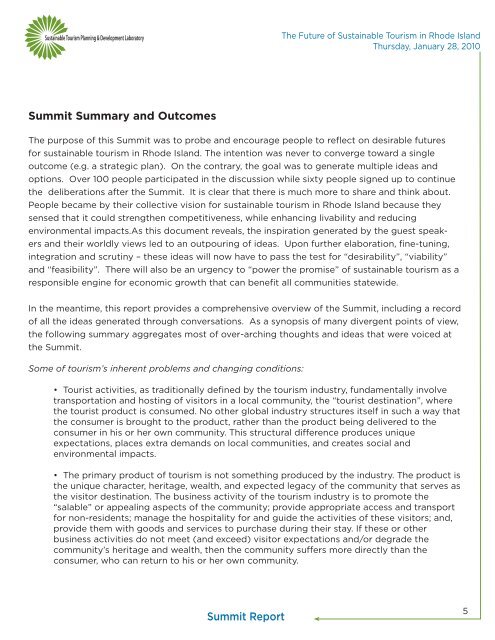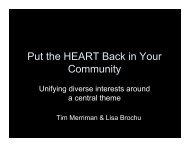Download PDF - Sustainable Tourism Lab
Download PDF - Sustainable Tourism Lab
Download PDF - Sustainable Tourism Lab
You also want an ePaper? Increase the reach of your titles
YUMPU automatically turns print PDFs into web optimized ePapers that Google loves.
The Future of <strong>Sustainable</strong> <strong>Tourism</strong> in Rhode Island<br />
Thursday, January 28, 2010<br />
Summit Summary and Outcomes<br />
The purpose of this Summit was to probe and encourage people to reflect on desirable futures<br />
for sustainable tourism in Rhode Island. The intention was never to converge toward a single<br />
outcome (e.g. a strategic plan). On the contrary, the goal was to generate multiple ideas and<br />
options. Over 100 people participated in the discussion while sixty people signed up to continue<br />
the deliberations after the Summit. It is clear that there is much more to share and think about.<br />
People became by their collective vision for sustainable tourism in Rhode Island because they<br />
sensed that it could strengthen competitiveness, while enhancing livability and reducing<br />
environmental impacts.As this document reveals, the inspiration generated by the guest speakers<br />
and their worldly views led to an outpouring of ideas. Upon further elaboration, fine-tuning,<br />
integration and scrutiny – these ideas will now have to pass the test for “desirability”, “viability”<br />
and “feasibility”. There will also be an urgency to “power the promise” of sustainable tourism as a<br />
responsible engine for economic growth that can benefit all communities statewide.<br />
In the meantime, this report provides a comprehensive overview of the Summit, including a record<br />
of all the ideas generated through conversations. As a synopsis of many divergent points of view,<br />
the following summary aggregates most of over-arching thoughts and ideas that were voiced at<br />
the Summit.<br />
Some of tourism’s inherent problems and changing conditions:<br />
• Tourist activities, as traditionally defined by the tourism industry, fundamentally involve<br />
transportation and hosting of visitors in a local community, the “tourist destination”, where<br />
the tourist product is consumed. No other global industry structures itself in such a way that<br />
the consumer is brought to the product, rather than the product being delivered to the<br />
consumer in his or her own community. This structural difference produces unique<br />
expectations, places extra demands on local communities, and creates social and<br />
environmental impacts.<br />
• The primary product of tourism is not something produced by the industry. The product is<br />
the unique character, heritage, wealth, and expected legacy of the community that serves as<br />
the visitor destination. The business activity of the tourism industry is to promote the<br />
“salable” or appealing aspects of the community; provide appropriate access and transport<br />
for non-residents; manage the hospitality for and guide the activities of these visitors; and,<br />
provide them with goods and services to purchase during their stay. If these or other<br />
business activities do not meet (and exceed) visitor expectations and/or degrade the<br />
community’s heritage and wealth, then the community suffers more directly than the<br />
consumer, who can return to his or her own community.<br />
Summit Report<br />
5





